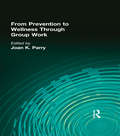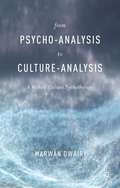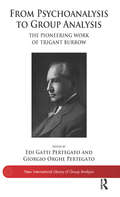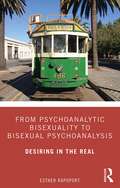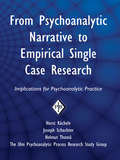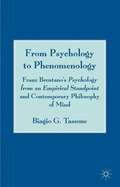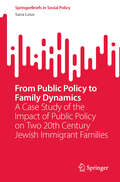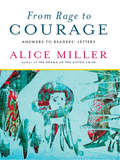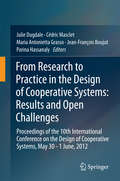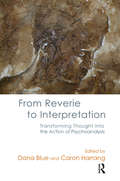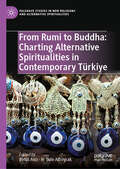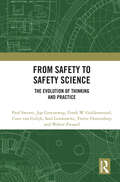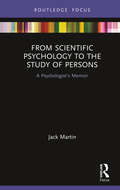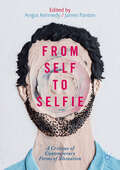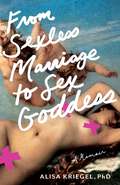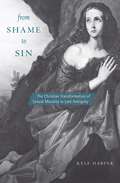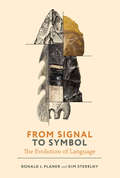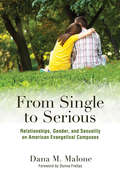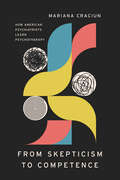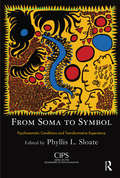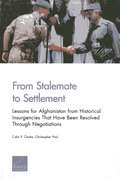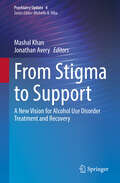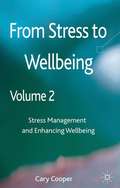- Table View
- List View
From Prevention to Wellness Through Group Work
by Joan K ParryOffering some of the most advanced thinking and practice in the arena of social work with groups, From Prevention to Wellness Through Group Work synthesizes the discussions and findings from the Annual Symposium of the Association for the Advancement of Social Work with Groups (AASWG). Gathered here are different ideas, techniques, and research (with a focus on prevention) for group work with seniors, adults, teens, and children. With a mix of authors from social work academia and practice, this book gives you groundbreaking theoretical pieces as well as emerging skills and techniques in group work. If you attended the conference you will refer to this book as a guide to the information presented. If you were not in attendance you need this book to discover what you missed!The two primary chapters in From Prevention to Wellness Through Group Work provide a look into constructivism and the power model and the empowerment approach as a paradigm for international social work practice. Other pertinent topics you learn about include: conflict management in group treatment a social skills program for emotionally disturbed children bullying and scapegoating in groups groups for persons who have experienced transplants groups for persons with AIDS the intersection of different realities in the group setting using poetry to revive traditional practice methods, theories, and values mutual aid, democratic participation, power sharing, and consciousness raisingFrom Prevention to Wellness Through Group Work also shows you how group experiences prevent breakdown and encourage wellness for older adults in senior centers and retirement communities; the definition, scope, and usefulness of psychoeducational groups; how group-based methods can enrich research; and how monitoring group practice can strengthen your effectiveness and credibility. You’ll find the book’s consistent focus on prevention while providing ways to improve both group work practice and research through cooperative efforts most helpful.
From Psycho-Analysis to Culture-Analysis
by Marwan DwairyThis book confronts the barriers that face the cross-cultural application of western psychotherapy. It puts forward an argument for applying culture analysis, in which the therapist analyses the inconsistencies within the client's culture, before applying psychoanalysis, in which the analyst analyses the intra-psychic conflicts. The book explains through several cases how metaphors, memories, and physical environment can be used to understand and analyze the client's belief system in a culturally sensitive way that mitigates the client's resistance and avoids confrontation with the family. In this way, the book will be invaluable for psychotherapists and psychoanalysts, as well as researchers of cross-cultural psychology.
From Psychoanalysis to the Group: The Pioneering Work of Trigant Burrow (The New International Library of Group Analysis)
by Edi Gatti Pertegato Giorgio Orghe PertegatoThis volume gathers a selection of psychoanalytic and group analytic essays by Trigant Burrow (1875-1950), precursor of group analysis and co-founder of the American Psychoanalytic Association. They show the development of the relational orientation in psychoanalysis, and the origin and evolution of group analysis, namely, from drive to the relation and the group processes as the person's structure. The events that led Burrow from psychoanalysis to group analysis, the censorship of the psychoanalytic orthodoxy, the silence of group analysis and the distortions of historiography are reported in the editors' introductory essay. The book presents the richness and originality of the theoretic, clinical, and methodological themes developed by Burrow either in the psychoanalytic or the group analytic fields.
From Psychoanalytic Bisexuality to Bisexual Psychoanalysis: Desiring in the Real
by Esther RapoportThis is the first book to assess bisexuality through a range of psychoanalytic and critical perspectives, highlighting both the issues faced by bisexual people in contemporary society and the challenges that can be presented by bisexual clients within a clinical setting. Examining bisexuality through the lenses of Lacanian, Winnicottian and Relational psychoanalytic theories, the book outlines the ways in which the concept is at once both dated and yet still tremendously important. It includes case studies to explore the issue of widespread countertransference responses in the clinical setting, in addition to using both bisexual theory and empirical research on biphobia to comment on the social pressures facing bisexual men and women, and the resultant psychological effects. Bisexual identities and practices have become increasingly visible in recent years, and this important book addresses the lack of critical reckoning with the topic within the psychoanalytic community. It will be of great interest to practicing psychoanalysts and psychotherapists as well as to researchers across the fields of psychoanalysis and gender and sexuality studies.
From Psychoanalytic Narrative to Empirical Single Case Research: Implications for Psychoanalytic Practice (Psychoanalytic Inquiry Book Series #Vol. 30)
by Horst Kächele Joseph Schachter Helmut ThomäRecognition of the need for empirical research and interest in its findings are growing in psychoanalysis. Many psychoanalysts now acknowledge that research is imperative to try to deal with the factors propelling the diminution in status and prestige of the discipline, as well as the number of patients in intensive psychoanalytic treatment. In addition, there is increased pressure to expose and acquaint candidates with analytic research in the course of their education. From Psychoanalytic Narrative to Empirical Single Case Research revivifies the experimental potential of psychoanalysis by focusing a number of structured research methods on a single case study. Drs. Kächele, Schachter, and Thomä, in tandem with the Ulm Psychoanalytic Process Research Study Group, bring their formidable tools and knowledge to bear on Amalia X, a former patient of Dr. Thomä’s, whose case history is well-documented, preserved and available for formal empirical study. After providing an intensive review of the problematic aspects of clinical psychoanalytic research and an exegesis on the use of the case study itself, the specific case history of Amalia X, which dominates and centers the remainder of the book, is thoroughly examined. The following two chapters – utilizing clinical and linguistic models, respectively – deconstruct Amalia’s psychopathology along a variety of methodological axes in an effort not only to uncover the roots of her presenting symptoms, but also to reify and validate the strange bedfellows of psychoanalysis and empiricism in general. The book would be incomplete, however, without its final chapter, which provides suggestions and insights into the clinical applications and implications of their combined research.
From Psychology to Phenomenology
by Biagio G. TassoneAlthough highly influential, Brentano's doctrines from Psychology from an Empirical Standpoint were taken up and changed by his students and subsequent thinkers. Tassone's study of this important text offers readers a better understanding of PES and outlines its ongoing relevance for contemporary philosophy of mind.
From Public Policy to Family Dynamics: A Case Study of the Impact of Public Policy on Two 20th Century Jewish Immigrant Families (SpringerBriefs in Social Policy)
by Sana LoueThis compact book relies on the story of two intertwined Jewish immigrant families to tell a multigenerational Jewish story about the interplay between public/social policy, cultural categories, and the lived experience of working class immigrant Jews from Eastern Europe, including trans-/intergenerational trauma. Importantly, it focuses on the impacts of pre-Holocaust public policy, a significant departure from the Holocaust and post-Holocaust focus of much of the published literature relating to Jewish intergenerational trauma. As such, it offers the possibility of better understanding the far-reaching and perhaps unforeseen impacts of public policy. This book addresses events on both the micro and macro levels and is biographical, autobiographical, and historical in its scope. Sources for this work include archival materials, census records, maps, military records, birth and death certificates, congressional materials, newspaper articles, films, images, interviews with living family members, and secondary sources. Among the topics covered are: Russian, Soviet, and U.S. Eugenics: Family Internalization of Policy and Rhetoric The Intertwined Impact of Economics, Eugenic Policy, and Immigration Restrictions The Present Past: Policy, Identity, and Progeny From Public Policy to Family Dynamics: A Case Study of the Impact of Public Policy on Two 20th Century Jewish Immigrant Families adds a human face to writings related to public/social policy. As the book integrates understandings from diverse fields of study, students of public policy, social work, psychology, history, Jewish studies, immigration studies, bioethics, and public health, as well as social workers, bioethicists, and historians, would be most interested in reading this unique work.
From Rage to Courage: Answers to Readers' Letters
by Alice MillerCollected for the first time, Alice Miller's most helpful, therapeutic, and invaluable answers to hundreds of readers' letters. The renowned childhood researcher, psychotherapist, and best-selling author Alice Miller has received, throughout her long and distinguished career, countless personal letters from readers all over the world. In From Rage to Courage, Dr. Miller has assembled the most recent, producing an insightful work that illuminates the issues and consequences of childhood abuse. Whether exploring the connection between repressed anger and physical illnesses like cancer, the reasons why many survivors of abuse turn to drugs or crime, or the cycle that condemns generations of families to cruelty in childhood, Dr. Miller's answers are sensitive, honest, and supported by decades of experience. Unafraid of controversy, she discusses much-debated theories such as the impact of religious belief on the cultural traditions of child abuse and the therapeutic community's denial of the truth and dependency on antidepressants. A practical guide to Dr. Miller's unique therapeutic concept, this work once again affirms the healing and liberating power of retrieved emotions.
From Research to Practice in the Design of Cooperative Systems: Results and Open Challenges
by Parina Hassanaly Maria Antonietta Grasso Jean-François Boujut Cédric Masclet Julie DugdaleCOOP 2012 is the tenth COOP conference, marking twenty years from the first conference in 1992. In this special anniversary edition we asked researchers and practitioners to reflect on what have been the successes and the failures in designing cooperative systems, and what challenges still need to be addressed. We have come a long way in understanding the intricacies of cooperation and in designing systems that support work practices and collective activities. These advances would not have been possible without the concerted effort of contributions from a plethora of domains including CSCW, HCI, Information Systems, Knowledge Engineering, Multi-agent systems, organizational and management sciences, sociology, psychology, anthropology, ergonomics, linguistics, etc. The COOP community is going from strength to strength in developing new technologies, advancing and proposing new methodological approaches, and forging theories.
From Reverie to Interpretation: Transforming Thought into the Action of Psychoanalysis
by Dana BlueBion's identification of reverie as a psychoanalytic concept has drawn attention to a dimension of the analyst's experience with tremendous potential to enrich our interpretive understanding. The courage of these authors in revealing their own process of reverie as transformed into the action of psychoanalysis will inspire and foster further investigation of this fruitful yet heretofore infrequently explored area of psychoanalytic discovery.
From Rumi to Buddha: Charting Alternative Spiritualities in Contemporary Türkiye (Palgrave Studies in New Religions and Alternative Spiritualities)
by Betül Avcı H. Şule AlbayrakAn anthology of diverse theoretical and methodological approaches to new spiritualities, this volume brings together interdisciplinary case studies from literature, sociology, psychology, anthropology, and religious studies. It focuses on a range of figures, movements, concepts, and practices associated with non-traditional spiritualities in contemporary Türkiye, examining how novel, eclectic, quasi-desacralized, and self-oriented forms of spirituality are increasingly favored over traditional ones. Grounded in the current cultural context, the contributors explore how spiritualities originally inspired by Southeast Asian traditions, Shamanic practices, and other sources are first transformed into Western forms, then adapted into Muslim-Turkish settings. The term &“alternative&” highlights the creative, eclectic, non-traditional, or even anti-religious nature of such practices. As the first volume of its kind, this book is an essential resource for scholars of new religious movements and alternative spiritualities in Türkiye.
From Safety to Safety Science: The Evolution of Thinking and Practice
by Frank W. Guldenmund Coen van Gulijk Paul Swuste Jop Groeneweg Saul Lemkowitz Yvette Oostendorp Walter ZwaardHow do accidents and disasters occur? How has knowledge of accident processes evolved? A significant improvement in safety has occurred during the past century, with the number of accidents falling spectacularly within industry, aviation and road traffic. This progress has been gradual in the context of a changing society. The improvements are partly due to a better understanding of the accident processes that ultimately lead to damage. This book shows how contemporary crises instigated the development of safety knowledge and how the safety sciences pieced their theories together by research, by experience and by taking ideas from other domains. From Safety to Safety Science details 150 years of knowledge development in the safety sciences. The authors have rigorously extracted the essence of safety knowledge development from more than 2,500 articles to provide a unique overview and insight into the background and usability of safety theories, as well as modelling how they developed and how they are used today. Extensive appendices and references provide an additional dimension to support further scholarly work in this field. The book is divided into clear time periods to make it an accessible piece of science history that will be invaluable to both new and experienced safety researchers, to safety courses and education, and to learned practitioners.
From Scientific Psychology to the Study of Persons: A Psychologist’s Memoir
by Jack MartinThis is a critical, personalized approach to reframing the discipline of psychology through a singular narrative in the form of a memoir written by a successful research psychologist. In this book we follow Martin’s unique career, which has allowed him to understand and adopt different perspectives and ways of approaching psychology, from working in applied areas like educational and counseling psychology to more specialized areas like theory and history of psychology. His journey through and within the field describes his movement away from scientifically based psychology, which views teachings and interventions to be primarily underwritten by hard scientific evidence. Martin exposes the flaws in this approach and highlights the importance of focusing on the study of persons in their life contexts over the use of aggregated group results to ensure that the discipline survives and flourishes. This is an impactful and universally applicable book with valuable insights for students and scholars of psychology today, particularly those studying history of psychology, theoretical psychology, and philosophical psychology.
From Self to Selfie: A Critique of Contemporary Forms of Alienation
by Angus Kennedy James PantonThis edited collection charts the rise and the fall of the self, from its emergence as an autonomous agent during the Enlightenment, to the modern-day selfie self, whose existence is realised only through continuous external validation. Tracing the trajectory of selfhood in its historical development - from the Reformation onwards - the authors introduce the classic liberal account of the self, based on ideas of freedom and autonomy, that dominated Enlightenment discourse. Subsequent chapters explore whether this traditional notion has been eclipsed by new, more rigid, categories of identity, that alienate the self from itself and its possibilities: what I am, it seems, has become more important than what I might make of myself. These changing dynamics of selfhood – the transition From Self to Selfie - reveal not only the peculiar ways in which selfhood is problematized in contemporary society, but equally the tragic fragility of the selfie, in the absence of any social authority that could give it some security.
From Self-Care to We-Care: The New Science of Mindful Boundaries and Caring from an Undivided Heart
by Jordan QuagliaLearn to harmonize self-care with caring for others through we-care, a science-based approach designed to enhance personal and social well-being, promote healthy boundaries, and offer a path of healing and transformation.Too many of us are familiar with the burnout that can come from overextending ourselves for others. Self-care is often promoted as the solution to this imbalance, but there are growing concerns that an overemphasis on self-care is exacerbating interpersonal challenges, fraying the fabric of our communities, and diminishing our responsiveness to broader social issues. In a world where time can feel increasingly scarce, we find ourselves in a dilemma: should we prioritize ourselves or others? Yet as psychologist and compassion scientist Jordan Quaglia demonstrates, this choice is based on a false dichotomy. The emerging science and practice of we-care reframes the very concept of care as a social force that includes both self and other. Through personal stories, guided inquiries, practical social exercises, and insights from cutting-edge neuroscience, Quaglia offers a framework and toolset designed to help you find a more balanced way to express your innate sense of compassion. This holistic approach sparks transformative changes across your health, relationships, and work—uplifting yourself and others while supporting a stronger, more connected society for us all.
From Sexless Marriage to Sex Goddess: A Memoir
by Alisa KriegelFor fans of Eat Pray Love and Maybe You Should Talk to Someone, a therapist&’s tale of mid-life sexual awakening as she bravely explores relationships, sex, and pleasure—and learns that it&’s never too late to desire and be desired.Is it ever too late to connect to the sexual part of yourself? At forty-eight years old, after her husband announced he had fallen in love with a man, Alisa Kriegel was determined to finally figure out this essential part of herself. As a psychologist, she had the tools to help others; now, it was time to help herself. Alisa&’s bold and vulnerable story told with honesty and humor, shows us that it&’s possible to have a sexual awakening—and to experience the thrill of feeling desired—at any age. Letting go of decades of shame and giving herself permission for pleasure was just the beginning of jumping into a series of adventures in online dating, sex, and romance. From sex clubs in New York City to a canoe trip in the Canadian wilderness, this memoir offers readers an insight-filled journey into one woman&’s mid-life discoveries about sex, love, and relationships—and a behind-the-scenes, in-depth analysis of women&’s sexuality.
From Shame to Sin
by Kyle HarperWhen Rome was at its height, an emperor’s male beloved, victim of an untimely death, would be worshipped around the empire as a god. In this same society, the routine sexual exploitation of poor and enslaved women was abetted by public institutions. Four centuries later, a Roman emperor commanded the mutilation of men caught in same-sex affairs, even as he affirmed the moral dignity of women without any civic claim to honor. The gradual transformation of the Roman world from polytheistic to Christian marks one of the most sweeping ideological changes of premodern history. At the center of it all was sex. Exploring sources in literature, philosophy, and art, Kyle Harper examines the rise of Christianity as a turning point in the history of sexuality and helps us see how the roots of modern sexuality are grounded in an ancient religious revolution. While Roman sexual culture was frankly and freely erotic, it was not completely unmoored from constraint. Offending against sexual morality was cause for shame, experienced through social condemnation. The rise of Christianity fundamentally changed the ethics of sexual behavior. In matters of morality, divine judgment transcended that of mere mortals, and shame-a social concept-gave way to the theological notion of sin. This transformed understanding led to Christianity’s explicit prohibitions of homosexuality, extramarital love, and prostitution. Most profound, however, was the emergence of the idea of free will in Christian dogma, which made all human action, including sexual behavior, accountable to the spiritual, not the physical, world.
From Signal to Symbol: The Evolution of Language (Life and Mind: Philosophical Issues in Biology and Psychology)
by Kim Sterelny Ronald PlanerA novel account of the evolution of language and the cognitive capacities on which language depends.In From Signal to Symbol, Ronald Planer and Kim Sterelny propose a novel theory of language: that modern language is the product of a long series of increasingly rich protolanguages evolving over the last two million years. Arguing that language and cognition coevolved, they give a central role to archaeological evidence and attempt to infer cognitive capacities on the basis of that evidence, which they link in turn to communicative capacities. Countering other accounts, which move directly from archaeological traces to language, Planer and Sterelny show that rudimentary forms of many of the elements on which language depends can be found in the great apes and were part of the equipment of the earliest species in our lineage. After outlining the constraints a theory of the evolution of language should satisfy and filling in the details of their model, they take up the evolution of words, composite utterances, and hierarchical structure. They consider the transition from a predominantly gestural to a predominantly vocal form of language and discuss the economic and social factors that led to language. Finally, they evaluate their theory in terms of the constraints previously laid out.
From Single to Serious: Relationships, Gender, and Sexuality on American Evangelical Campuses
by Dana M. MaloneCollege students hook up and have sex. That is what many students expect to happen during their time at university—it is part of growing up and navigating the relationship scene on most American campuses today. But what do you do when you’re a student at an evangelical university? Students at these schools must negotiate a barrage of religiously imbued undercurrents that impact how they think about relationships, in addition to how they experience and evaluate them. As they work to form successful unions, students at evangelical colleges balance sacred ideologies of purity, holiness, and godliness, while also dealing with more mainstream notions of popularity, the online world, and the appeal of sexual intimacy. In From Single to Serious, Dana M. Malone shines a light on friendship, dating, and, sexuality, in both the ideals and the practical experiences of heterosexual students at U. S. evangelical colleges. She examines the struggles they have in balancing their gendered and religious presentations of self, the expectations of their campus community, and their desire to find meaningful romantic relationships.
From Skepticism to Competence: How American Psychiatrists Learn Psychotherapy (Ethnographic Encounters and Discoveries)
by Mariana CraciunAn examination of how novice psychiatrists come to understand the workings of the mind—and the nature of medical expertise—as they are trained in psychotherapy. While many medical professionals can physically examine the body to identify and understand its troubles—a cardiologist can take a scan of the heart, an endocrinologist can measure hormone levels, an oncologist can locate a tumor—psychiatrists have a much harder time unlocking the inner workings of the brain or its metaphysical counterpart, the mind. In From Skepticism to Competence, sociologist Mariana Craciun delves into the radical uncertainty of psychiatric work by following medical residents in the field as they learn about psychotherapeutic methods. Most are skeptical at the start. While they are well equipped to treat brain diseases through prescription drugs, they must set their expectations aside and learn how to navigate their patients’ minds. Their instructors, experienced psychotherapists, help the budding psychiatrists navigate this new professional terrain by revealing the inner workings of talk and behavioral interventions and stressing their utility in a world dominated by pharmaceutical treatments. In the process, the residents examine their own doctoring assumptions and develop new competencies in psychotherapy. Exploring the world of contemporary psychiatric training, Craciun illuminates novice physicians’ struggles to understand the nature and meaning of mental illness and, with it, their own growing medical expertise.
From Soma to Symbol: Psychosomatic Conditions and Transformative Experience (CIPS (Confederation of Independent Psychoanalytic Societies) Boundaries of Psychoanalysis)
by Phyllis L. SloateThis book traces the theoretical history of psychosomatics in psychoanalysis, and with it the ways that psychoanalytically-trained clinicians have tried to understand and treat patients with complex psychosomatic symptoms. It offers a rethinking of the mind-body relationship in psychoanalysis, eschewing past dichotomies between the psychological and the corporeal, and today's either-or distinctions between symbolizing and non-symbolizing patients. Theoretical and clinical issues are considered from a broad and integrative perspective. Psychosomatic patients' best interests are served neither by an indiscriminate embrace of dazzling new findings, nor by discarding established ways of understanding them. This volume exemplifies an approach that takes advantage of the rich history of the past as well as exciting new work in the neurosciences. The opening historical chapter delineates the evolution of the field of psychoanalytic psychosomatics.
From Stalemate to Settlement: Lessons for Afghanistan from Historical Insurgencies That Have Been Resolved Through Negotiations
by Christopher Paul Colin P. ClarkeA comprehensive review of historical insurgencies that ended in settlement after a military stalemate shows that these negotiations followed a similar path that can be generalized into a "master narrative" of seven steps executed in a common sequence. Such a narrative could help guide and assess the progress of a similar approach to resolving the conflict in Afghanistan as U. S. forces prepare to withdraw.
From Stalemate to Settlement: Lessons for Afghanistan from Historical Insurgencies That Have Been Resolved Through Negotiations
by Christopher Paul Colin P. ClarkeA comprehensive review of historical insurgencies that ended in settlement after a military stalemate shows that these negotiations followed a similar path that can be generalized into a "master narrative" of seven steps executed in a common sequence. Such a narrative could help guide and assess the progress of a similar approach to resolving the conflict in Afghanistan as U. S. forces prepare to withdraw.
From Stigma to Support: A New Vision for Alcohol Use Disorder Treatment and Recovery (Psychiatry Update #4)
by Jonathan Avery Mashal KhanThis book provides the reader with a thorough understanding of the science of addiction, as well as practical tools for diagnosing, treating, and supporting individuals with alcohol use disorder. It also offers guidance for building a successful recovery and preventing relapse, and it serves as a comprehensive and evidence-based resource that brings together the latest scientific research and guidelines endorsed by expert professionals. Alcohol use disorder is a prevalent and complex disease that affects millions of people worldwide, yet is often misunderstood and stigmatized. This book is intended to contribute to reducing the stigma and misconceptions surrounding the disease and promoting access to evidence-based treatment and support. This volume is structured in a way that allows readers to move through the content in a logical and accessible manner. The first few chapters provide an overview of alcohol use disorder, its historical and cultural context, and the science of addiction. Following that, authors delve into the various causes and risk factors for alcohol use disorder, signs and symptoms, diagnosis and screening tools, and co-occurring mental health conditions. The treatment options for alcohol use disorder are covered in depth, including medication-assisted treatment, behavioral therapies, and support systems for recovery. Chapters explore ways to prevent relapse and build a successful life in recovery. Additionally, the subject of stigma and misconceptions surrounding addictions such as alcohol use disorder is discussed, as are the barriers in building greater awareness, understanding, and access to care. A chapter on advocacy and policy aims to identify and highlight various paths taken in improving access to treatment and recovery support services, and the book closes with a chapter on all the major research and promising treatments that are currently underway. From Stigma to Support: A New Vision for Alcohol Use Disorder Treatment and Recovery is a comprehensive and practical guide that will be greatly valued by psychiatrists and any other medical provider that might treat patients with alcohol use disorder.
From Stress to Wellbeing Volume 2
by Cary L. CooperA comprehensive collection by Professor Cary Cooper and his colleagues in the field of workplace stress and wellbeing, which draws on research in a number of areas including stress-strain relationships, sources of workplace stress and stressful occupations. Volume 2 of 2.
